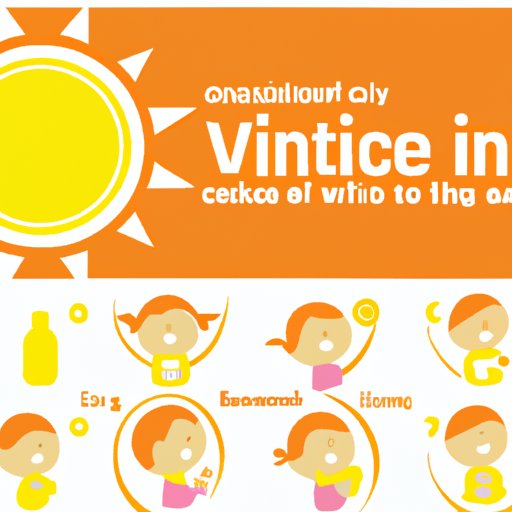Introduction
Vitamin C is an essential nutrient that plays a vital role in maintaining overall health. It has antioxidant properties that support the immune system, helps form collagen for healthy skin, bones, and teeth, and aids in the absorption of iron. As such, it is important to ensure that children are getting enough vitamin C in their diets.
When it comes to determining how much vitamin C is too much for a growing child, the answer isn’t always straightforward. This article will explore the pros and cons of giving a child 500mg of vitamin C, as well as analyze the scientific evidence behind recommended vitamin C intake for children and review the potential side effects of exceeding the recommended dosage.
Examining Potential Health Benefits and Risks of Supplementing a Child’s Diet with 500mg of Vitamin C
According to the National Institutes of Health (NIH), the recommended daily allowance (RDA) of vitamin C for children aged 1-3 years is 15 mg per day; for children aged 4-8 years, the RDA increases to 25 mg per day. Children aged 9-13 years should get 45 mg per day, while adolescents aged 14-18 years should get 75 mg per day.
Although the NIH’s RDA for vitamin C is lower than 500mg, there are certain situations where supplementing a child’s diet with 500mg of vitamin C may be beneficial. For example, if a child is active in sports or has recently been ill, they may need more vitamin C than the RDA suggests. Additionally, vitamin C can help reduce inflammation and oxidative stress in the body, which can be beneficial for children who have chronic conditions.
Analyzing the Scientific Evidence Behind Recommended Vitamin C Intake for Children
In order to determine whether 500mg of vitamin C is too much for a growing child, it is important to examine the scientific evidence behind the recommended vitamin C intake for children. A recent study published in the journal Pediatrics found that supplementing children’s diets with up to 500mg of vitamin C had no adverse effects on their health. However, the authors cautioned against giving children more than 500mg of vitamin C per day, as this could lead to gastrointestinal issues such as diarrhea and abdominal pain.
It is also important to consider the nutritional value of 500mg of vitamin C for kids. The American Academy of Pediatrics recommends that children get a minimum of five servings of fruits and vegetables per day. One serving of fruit or vegetable can provide up to 60mg of vitamin C, so consuming five servings per day would give a child 300mg of vitamin C. Thus, adding 500mg of vitamin C to a child’s diet would exceed the recommended amount.

Reviewing the Potential Side Effects of Exceeding the Recommended Dosage of Vitamin C for Children
While 500mg of vitamin C may not be dangerous for most children, it is important to be aware of the potential side effects of exceeding the recommended dosage. Consuming large amounts of vitamin C can lead to digestive issues such as nausea, vomiting, and diarrhea. Additionally, taking too much vitamin C can cause kidney stones in some people. It is also important to note that high doses of vitamin C can interfere with the absorption of other nutrients, such as iron and calcium.
Additionally, it is important to consider the source of the vitamin C supplement. Many supplements contain added sugars, artificial colors, and other additives that can be harmful to a child’s health. Therefore, it is important to choose a supplement that is made from natural ingredients and free of additives.
Conclusion
In conclusion, supplementing a child’s diet with 500mg of vitamin C may be beneficial in certain circumstances, such as when a child is recovering from an illness or is active in sports. However, it is important to consult a doctor before giving a child any vitamin C supplement and to be aware of the potential side effects of exceeding the recommended dosage. Additionally, it is important to choose a supplement that is made from natural ingredients and free of additives.
Overall, the pros and cons of giving a child 500mg of vitamin C must be carefully weighed before making a decision. While it can provide some health benefits, it is important to make sure that it does not exceed the recommended dosage and to choose a supplement that is free of additives.

Summary of Pros and Cons of Giving a Child 500mg of Vitamin C
The pros of giving a child 500mg of vitamin C include providing additional antioxidants and nutrients, reducing inflammation and oxidative stress, and helping to absorb iron. The cons include potential digestive issues, interference with other nutrient absorption, and the risk of kidney stones. Additionally, it is important to choose a supplement that is free of additives.

Final Thoughts on Appropriate Vitamin C Intake for Children
When it comes to determining how much vitamin C is too much for a growing child, the answer isn’t always straightforward. While supplementing a child’s diet with 500mg of vitamin C may be beneficial in certain circumstances, it is important to consult a doctor before giving a child any vitamin C supplement and to be aware of the potential side effects of exceeding the recommended dosage. Moreover, it is important to choose a supplement that is made from natural ingredients and free of additives.


